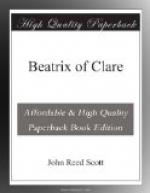“Welcome, Robert,” said Richard, giving him his hand. “What brings you in such haste?”
“Matters which are for your ears alone, Sire,” said the Constable of the Tower, with the abruptness of a favored counsellor.
The King walked to a distant window.
“Might the two-faced Lord Steward hear us?” Brackenbury asked.
“No danger, speak—what is amiss in London?”
“Enough and to spare. Edward’s sons are dead.”
Even Richard’s wonderful self-control was unequal to such news, and he started back.
“Holy Paul!” he exclaimed, under his breath; then stood with bent head. . . “How happened it?”
“No one knows, certainly. As you expressly ordered, either the lieutenant or myself regularly locked their apartments at sundown and opened them at dawn. Two nights since I, myself, turned key upon them. In the morning I found them dead—in each breast a grievous wound—Edward’s bloody dagger on the floor.”
“And your view of it?”
“That Edward killed Richard and himself. He had lately been oppressed with heavy melancholy.”
The King shook his head. “Yes, that is doubtless the solution, yet scant credence will be given it. To the Kingdom it will be murder foul. . . Yet, pardieu! who else know it?”
“None but my lieutenant.”
“And his discretion?”
“Beyond suspicion. He has forgotten it long since.”
Richard called De Lacy to him. “Let Suffolk, Lovel, Ratcliffe, D’Evereux and Catesby be summoned instantly,” he ordered.
“My friends,” said he, when the last of them had come, “I have sore need of your wisdom and counsel. Hark to the mournful tidings Sir Robert Brackenbury brings.”
Bluntly and simply the old Knight told the story. When he ended there was deep concern on every face and all eyes turned toward the King.
“You perceive, my lords, the gravity of the situation,” said Richard. “What shall be done?”
None answered.
“Come, sirs; it is here and we must face it. What say you, Stanley?”
The Lord Steward swept the circle with a keen glance.
“Your Majesty has put a direful question and given us scant time for thought,” he replied. “Yet but two courses seem possible: either to proclaim the Princes dead by natural causes and give them public burial; or to conceal the death, and by letting the world fancy them life prisoners so forget them. Each has its advantage; but on the whole, the latter may be better. Nathless, this much is self-evident—the true tale dare not be told. Daggers, blood, and death are inexplicable when Kings’ sons are the victims, save on one hypothesis.”
One after another endorsed these words, until finally
it came back to the
King for decision.
For a long while he sat silent, staring into vacancy. Through the open windows floated the noises of the courtyard—the neigh of a horse, the call of a soldier, the rattle of steel on stone; from the anteroom came the hum of voices, the tramp of a foot, the echo of a laugh. But within, no one spoke nor even stirred. Not a man there but understood the fatefulness of the moment and the tremendous consequences of the decision, which, once made, might never be amended. At length he spoke.




